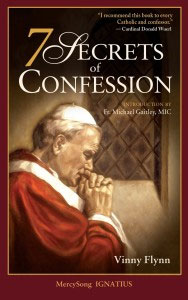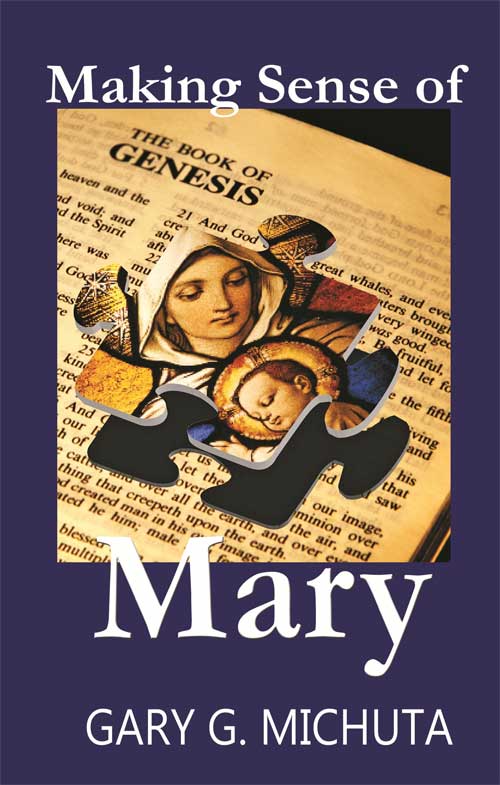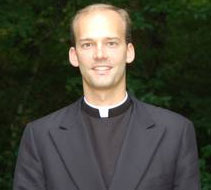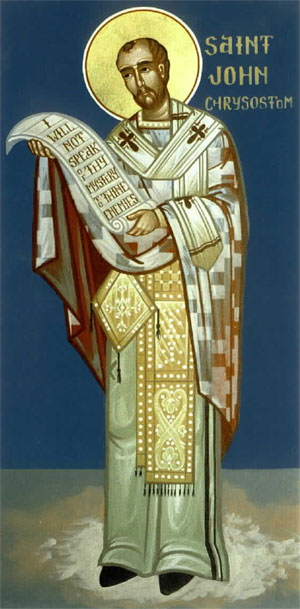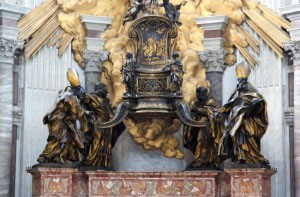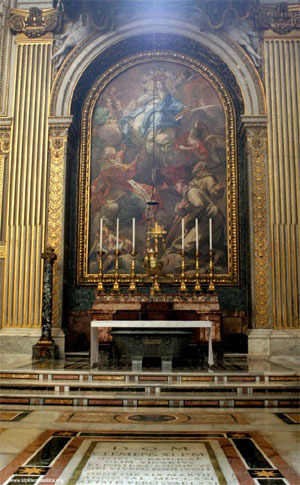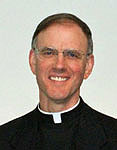[powerpress]
Msgr. Esseff reflects on the life and teachings of St. Padre Pio. Â He shares personal stories from his relationship with St. 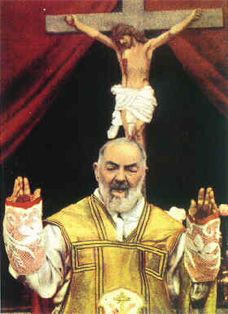 Pio.
Pio.
Gospel    LK 8:16-18
“No one who lights a lamp conceals it with a vessel
or sets it under a bed;
rather, he places it on a lampstand
so that those who enter may see the light.
For there is nothing hidden that will not become visible,
and nothing secret that will not be known and come to light.
Take care, then, how you hear.
To anyone who has, more will be given,
and from the one who has not,
even what he seems to have will be taken away.â€
Tags: Jesus, padre pio, reflection, relationship
This entry was posted on Monday, September 23rd, 2013 at 11:33 am
You can follow any responses to this entry through the RSS 2.0 feed.
Dr. Matthew Bunson discusses the life, times and work of  St. Ephrem of Syria
[powerpress]
For more on St. Ephrem and his teachings
- Nisibene Hymns  - Miscellaneous Hymns —
On the Nativity of Christ in the Flesh,
For the Feast of the Epiphany, and
On the Faith (“The Pearl”)Â Â -Â Homilies —
On Our Lord, On Admonition and Repentance,
and On the Sinful Woman
The figure of Ephrem is still absolutely timely for the life of the various Christian Churches. We discover him in the first place as a theologian who reflects poetically, on the basis of Holy Scripture, on the mystery of man’s redemption brought about by Christ, the Word of God incarnate. His is a theological reflection
expressed in images and symbols taken from nature, daily life and the Bible. Ephrem gives his poetry and liturgical hymns a didactic and catechetical character: they are theological hymns yet at the same time suitable for recitation or liturgical song. On the occasion of liturgical feasts, Ephrem made use of these hymns to spread Church doctrine. Time has proven them to be an extremely effective catechetical instrument for the Christian community.
Ephrem’s reflection on the theme of God the Creator is important: nothing in creation is isolated and the world, next to Sacred Scripture, is a Bible of God. By using his freedom wrongly, man upsets the cosmic order. The role of women was important to Ephrem. The way he spoke of them was always inspired with sensitivity and respect: the dwelling place of Jesus in Mary’s womb greatly increased women’s dignity. Ephrem held that just as there is no Redemption without Jesus, there is no Incarnation without Mary. The divine and human dimensions of the mystery of our redemption can already be found in Ephrem’s texts; poetically and with fundamentally scriptural images, he anticipated the theological background and in some way the very language of the great Christological definitions of the fifth-century Councils.
Ephrem, honoured by Christian tradition with the title “Harp of the Holy Spirit”, remained a deacon of the Church throughout his life. It was a crucial and emblematic decision: he was a deacon, a servant, in his liturgical ministry, and more radically, in his love for Christ, whose praises he sang in an unparalleled way, and also in his love for his brethren, whom he introduced with rare skill to the knowledge of divine Revelation.
For more visit Vatican.va
Dr. Matthew Bunson, Senior Fellow of the St. Paul Center for Biblical Theology, is one of the United States’ leading authorities on the papacy and the Church.
His books include: The Encyclopedia of Catholic History; The Encyclopedia of Saints; Papal Wisdom; All Shall Be Well; Encyclopedia of the Roman Empire; and The Angelic Doctor: The Life and World of St. Thomas Aquinas; The Pope Encyclopedia; We Have a Pope! Benedict XVI, the first Catholic biography of the Holy Father in the English language; the Encyclopedia of U.S. Catholic History; Pope Francis. Â His also the editor of OSV’s “The Catholic Answer” magazine.
Tags: Church, matthew bunson, Syria, work
This entry was posted on Monday, September 23rd, 2013 at 11:25 am
You can follow any responses to this entry through the RSS 2.0 feed.
What a delight to talk once again to the incredible Vinny Flynn, this time about his book “The 7 Secrets of Confession”. 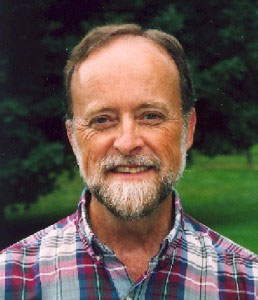 Vinny has such a passion for the Catholic faith, and in particular for the Sacraments of the Church, that it’s difficult not to be inspired by his joy.  This is perfect for anyone who struggles with this rich gift of grace and mercy, the sacrament  “Confession”.  But even more than that, it is like a “booster shot” for anyone who frequents the confessional, but may be taking it for granted.  A definite “must have” for every Catholic home library.  This would also be a great gift for those in the RCIA or in sacramental preparation in RE classes.
Vinny has such a passion for the Catholic faith, and in particular for the Sacraments of the Church, that it’s difficult not to be inspired by his joy.  This is perfect for anyone who struggles with this rich gift of grace and mercy, the sacrament  “Confession”.  But even more than that, it is like a “booster shot” for anyone who frequents the confessional, but may be taking it for granted.  A definite “must have” for every Catholic home library.  This would also be a great gift for those in the RCIA or in sacramental preparation in RE classes.
[powerpress]
You can find the book here
Vinny Flynn s 7 Secrets are like seven explosions that blow away the obstacles keeping us from the Sacrament of Mercy. If you ve ever dragged your feet on the way to confession, gotten discouraged about confessing the same sins over and over, or wondered how your confessions could be more fruitful, then you ll love this book. It turns what many see as a tiresome obligation into a precious, longed-for encounter with the Lord.
—Fr. Michael Gaitley, MIC Author, 33 Days to Morning Glory
This entry was posted on Monday, September 23rd, 2013 at 11:06 am
You can follow any responses to this entry through the RSS 2.0 feed.
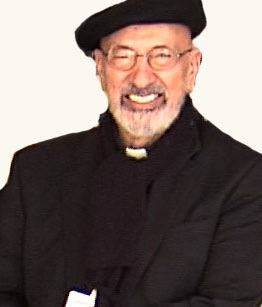 Show 46 ” Building a Kingdom of Love” –  “You cannot serve both God and mammon.â€
Show 46 ” Building a Kingdom of Love” –  “You cannot serve both God and mammon.â€
[powerpress]
Msgr. Esseff reflects on the teaching of Jesus:
Gospel
LK 16:1-13
Jesus said to his disciples,
“A rich man had a steward
who was reported to him for squandering his property.
He summoned him and said,
‘What is this I hear about you?
Prepare a full account of your stewardship,
because you can no longer be my steward.’
The steward said to himself, ‘What shall I do,
now that my master is taking the position of steward away from me?
I am not strong enough to dig and I am ashamed to beg.
I know what I shall do so that,
when I am removed from the stewardship,
they may welcome me into their homes.’
He called in his master’s debtors one by one.
To the first he said,
‘How much do you owe my master?’
He replied, ‘One hundred measures of olive oil.’
He said to him, ‘Here is your promissory note.
Sit down and quickly write one for fifty.’
Then to another the steward said, ‘And you, how much do you owe?’
He replied, ‘One hundred kors of wheat.’
The steward said to him, ‘Here is your promissory note;
write one for eighty.’
And the master commended that dishonest steward for acting prudently.
“For the children of this world
are more prudent in dealing with their own generation
than are the children of light.
I tell you, make friends for yourselves with dishonest wealth,
so that when it fails, you will be welcomed into eternal dwellings.
The person who is trustworthy in very small matters
is also trustworthy in great ones;
and the person who is dishonest in very small matters
is also dishonest in great ones.
If, therefore, you are not trustworthy with dishonest wealth,
who will trust you with true wealth?
If you are not trustworthy with what belongs to another,
who will give you what is yours?
No servant can serve two masters.
He will either hate one and love the other,
or be devoted to one and despise the other.
You cannot serve both God and mammon.â€
Msgr. John A. Esseff is a Roman Catholic priest in the Diocese of Scranton. He was ordained on May 30th 1953, by the late Bishop William J. Hafey, D.D. at St. Peter’s Cathedral in Scranton, PA. Msgr. Esseff served a retreat director and confessor to Blessed Mother Teresa.   He continues to offer direction and retreats for the sisters of the missionaries of charity around the world. Msgr. Esseff encountered St.  Padre Pio,  who would become a spiritual father to him. He has lived in areas around the world,  serving  in the Pontifical missions, a Catholic organization established by Bl. Pope John Paul II to bring the Good News to the world especially to the poor. Msgr. Esseff assisted the founders of the Institute for Priestly Formation and continues to serve as a spiritual director for the Institute. He continues to  serve as a retreat leader and director to bishops, priests and sisters and seminarians and other religious leaders around the world. Â
To obtain a copy of Msgr. Esseff’s book byvisiting here
Be sure to visit Msgr. Esseff’s website “Building a Kingdom of  Love”
Tags: Good News, LK, PA, retreat
This entry was posted on Sunday, September 22nd, 2013 at 6:20 pm
You can follow any responses to this entry through the RSS 2.0 feed.
There’s no doubt that Gary Michuta has a great love  for the Blessed Virgin Mary. In “Making Sense of Mary“, he offers  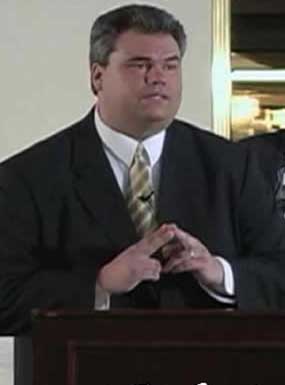 rich insight and research in regards to the teachings on Our Lady.  Steeped in Sacred Scripture and the teachings of the Fathers of the Church, Gary shines a beautiful light on the multi-facet diamond which is Mary, the Mother of God. Wonderful.
rich insight and research in regards to the teachings on Our Lady. Â Steeped in Sacred Scripture and the teachings of the Fathers of the Church, Gary shines a beautiful light on the multi-facet diamond which is Mary, the Mother of God. Wonderful.
[powerpress]
You can find the book here
“The world is full of nonsense when it comes to the Blessed Virgin Mary from simple confusion and ignorance to disrespect and blasphemy. Michuta has done us a great service by blowing away the fog and shining the light of clarity on a matter so important to the story of God’s salvation. Drawing from Scripture, Sacred Tradition, Councils and the Fathers of the Church, Gary helps scholars and beginners alike to understand the ABC’s of the person and role of Mary.”
Stephen K. Ray, Author of Crossing The Tiber and Host of The Footprints of God video Series “
Tags: fathers of the church, gary michuta, the Blessed Virgin Mary
This entry was posted on Thursday, September 19th, 2013 at 7:40 pm
You can follow any responses to this entry through the RSS 2.0 feed.
Episode 3 – Regnum Novum: Bringing forth the New Evangelization through Catholic Social Teaching with Omar Guiterrez - Value # 3 – Look , Judge, Act
- Value # 3 – Look , Judge, Act
[powerpress]
From episode 3 Â Â Â Look , Judge, Act
Blessed Pope John XXIII gave us this practical suggestion in his letter Mater et magistra. The Social Doctrine provides us with principles for reflection, criteria for judgment, and directives for action. Social justice is supposed to be lived out in our every day. That’s the point, and so this Holy Father gave us the paradigm.
Look at the world around you, that which is most immediate to you. Start with your family. Proceed to your culture. Witness the social and economic realities/policies near you. Know the political landscape of your city, county, state, and nation. See your neighbors close at hand and around the world. Use the principles of the Social Teaching as you look so that you know what to look for.
Judge what is best for the family, for the culture, for the society and the economy, for the state, for the world. Use the criteria provided by the Social Doctrine. What is missing? Why is it missing? What can be done?
Act on it. You’re a lay person with as real an obligation to evangelization as any priest. Do something in the world so as to make it’s semblance more like that which the Lord desires. Volunteer. Participate. Pray. Do not let some tell you that prayer is not action. Pray. You can pray and raise good children.
We live at a very special time. The confluence of many things has brought forth the clear need to be able to articulate the Social Teaching of the Catholic Church in a way that is accessible and applicable. This is not to be an effort where high-minded theories are to be bandied about. Rather, this is a time of opportunity wherein we can apply the Social Doctrine to the concrete so as to bring about a New Kingdom, a Revolution. – Omar G.Â
Discerning Hearts is blessed to present Omar F. A. Guiterrez, M.A. , Special Assistant  to Archbishop George Lucas of the Archdiocese of Omaha, in a groundbreaking series which breaks open the heart of Catholic Social Doctrine.
Tags: family, lay person, New Kingdom, social doctrine, Social Teaching, social work, special time, work
This entry was posted on Tuesday, September 17th, 2013 at 9:26 am
You can follow any responses to this entry through the RSS 2.0 feed.
Episode 21 Beginning to Pray: Â St. Hildegard von Bingen and “The Iron Mountain”
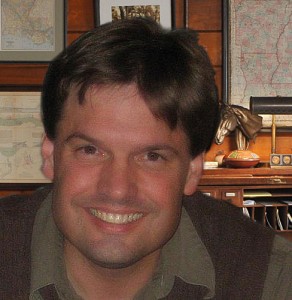
[powerpress]
From Dr. Lilles’ “Beginning to Pray” blog site:
September 17 is the feast of St. Hiildegard of Bingen. She lived from 1098-1179. A Benedictine Nun, at the age of 42, she was given visions and commanded rise up and cry out what she saw. She obeyed and produced a set of writings known today as Scivias.
Her first vision is of a hidden mountain, the mountain of God’s throne, an iron mountain of immutable justice hidden in divine glory. A purifying Fear of the Lord contemplates this splendor. Not the kind of fear that pulls away to protect itself. Rather the kind of fear that is vigilant and sees the truth. Eyes which gaze with this holy fear can never be satisfied with the merely mediocre. They guard against every form of compromise. The glory they behold demands absolute allegiance, complete surrender, and total humility.
In this description, is St. Hildegard suggesting a way by which we might enjoy the same vision she has shared in? This is no exercise in esoteric navel gazing. Her vision demands a journey beyond our own self-pre-occupation and into real friendship with God, a friendship protected by the strength of divine justice. She sees the truth in a way that demands an ongoing conversion of life.
She is well-formed in St. Benedict’s conversatio morum. The mountain she sees is not a truth we scrutinize so much as the truth that scrutinizes us: a scrutinizing of all our thoughts and actions in light of the Gospel. The truth she beholds demands repentance from the lack of justice we allow ourselves to slip into. The iron mountain she contemplates renders futile every effort to conform the Gospel to our own ways and invites us to be transformed by its just demands.
Today, where all kinds of cruelty are so easily excused and any form of self-indulgence so readily lifted up to the level of a fundamental human right, we need to rediscover the shadow of the iron mountain from which St. Hildegard cries out to us. Only under the glory of this mountain can we find the peace that the Lord has come to give. Only in the blinding light into which Holy Fear gazes can we find the humility to love one another the way Christ has loved us.
Dr. Anthony Lilles is a Catholic husband and father of three teaching Spiritual Theology at St. John Vianney Theological Seminary. He  teaches spiritual theology and spiritual direction to transitional deacons, and the spiritual classics to the men who enter the Spirituality Year, a year of prayer in preparation for seminary formation.  He is the author of the “Beginning to Pray”  catholic blog spot.
For other episodes in the series visit the Discerning Hearts page for Dr. Anthony Lilles
The music that is used comes from 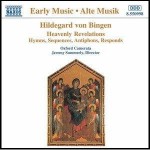
This the text we use  for our readings comes from:
Tags: Anthony Lilles, catholic, catholic podcast, catholic prayer, cathollc spirituality, father, mystic, mystic of the Church, spiritual direction, Spirituality Year, st hildegard of bingen
This entry was posted on Tuesday, September 17th, 2013 at 4:16 am
You can follow any responses to this entry through the RSS 2.0 feed.
Episode 6 -Listening For Truth–   The difficult stage in moral conversion, not only leaving the sin behind, but also leaving the community of people who desire to hold on to that sin.  It might mean separating from family members, friends, etc, but the hope is that that may possibly follow if we hang in there in that witness of Truth.  Also, life doesn’t stop in our suffering. Many will come who are attracted to the change. How we love those in need will indicate growth even in the crucifixion.  The negative…we reject something, the positive…we embrace something.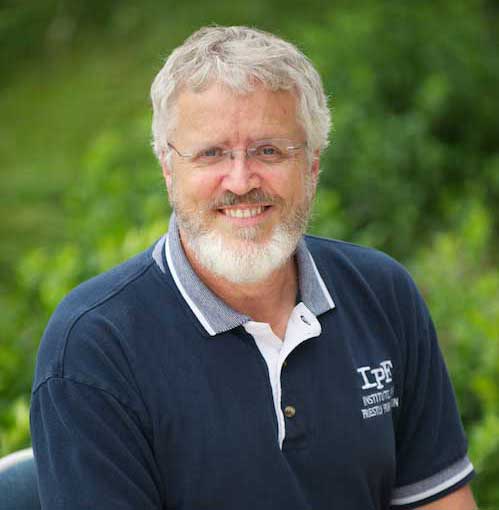
[powerpress]
Deacon James Keating, PhD., the director of Theological Formation for the Institute for Priestly Formation, located at Creighton University, in Omaha, is making available to â€Discerning Hearts†and all who listen, his series of programs entitled “Listening For Truthâ€.
 Listening for Truth leads men and women in a search for a fuller experience of God that begins in prayer, grows in the rediscovery of our spiritual being, and grounds itself in the truth of Jesus Christ. A presentation of the Christian life as an engagement of the whole person — body, mind, and soul — in the challenge of daily living.
Listening for Truth leads men and women in a search for a fuller experience of God that begins in prayer, grows in the rediscovery of our spiritual being, and grounds itself in the truth of Jesus Christ. A presentation of the Christian life as an engagement of the whole person — body, mind, and soul — in the challenge of daily living.
For more information on the “Institute of Priestly Formation†and for other material available by Deacon Keating, just click here
Don’t forget to pickup a copy of “Communion with Christ†, it is one of the best audio sets on prayer…ever!
Check out Deacon Keating’s “Discerning Heart†page
Tags: creighton university, Deacon James Keating, Deacon Keating, prayer, sin
This entry was posted on Monday, September 16th, 2013 at 10:04 am
You can follow any responses to this entry through the RSS 2.0 feed.
USCCA2- Episode 2-Â God Comes to Meet Us
[powerpress]
Archbishop Lucas offers insights on the US Catholic Catechism for Adults Chapter 2:
Through the use of reason, we can learn much about God from both creation and conscience, but Revelation enables us to learn about God’s inner life and his loving plan to save us from sin and share in his divine life.  No amount of unaided thinking could penetrate such a mystery.  God freely chose to share this hidden mystery with us . God’s sharing was an act of friendship  for us, revealing himself as one reveals his or her heart to a friend.  Love does such things.
The Most Reverend George J. Lucas leads the Archdiocese of Omaha.Â
For other episodes in the visit our Archbishop George Lucas page
This programs is based on:
More information can be found here.
We wish to thank the USCCB for the permissions granted for use of  relevant material used in this series.
Also we wish to thank Teresa Monaghen and Deacon Chuck Adams for their vocal talents in this episode.
Tags: Archbishop George Lucas, Archbishop Lucas, creation, USCCB
This entry was posted on Monday, September 16th, 2013 at 9:52 am
You can follow any responses to this entry through the RSS 2.0 feed.
Sacred Tradition
[powerpress]
On this Faith Check we’re talking about Tradition!
For many Christians, Tradition can be a sort of dirty word. This is probably because of Jesus’ harsh words for the tradition of the Pharisees,1 who added unnecessary rituals and ignored the weightier matters of God’s Law.
But some traditions can be good and helpful in our spiritual journey. Things like putting up a Nativity scene, praying the rosary, or fasting. These are not doctrines, but customs that we do as Catholics to help draw us closer to God.
Catholics also speak of Sacred Tradition with a “capital T,†which is the very message of Christ that has been faithfully handed down to us from the apostles.2 For example, St. Paul writes in 2 Thessalonians 2:15 to “stand firm and hold to the traditions you were taught by us, either by word of mouth or by letter.†Here Scripture itself teaches that the Word of God can come to us both through written Scripture and oral Tradition—either way, we are to receive it equally as God’s Word.
For a synopsis of the Sacred Tradition today, pick up a copy of the Catechism of the Catholic Church.
1 – Mk. 7:6-23, etc.
2 – cf. 1 Cor. 11:2, etc.
Tags: customs, Faith Check, fasting, Sacred Tradition
This entry was posted on Monday, September 16th, 2013 at 7:29 am
You can follow any responses to this entry through the RSS 2.0 feed.
[powerpress]

Born: 310 AD,
Died: May 2, 367 AD
For more on St. Hilary of Poitiers and his teachings
Hilary of Poitiers
-Â On the Councils, or the Faith of the Easterns
-Â On the Trinity
-Â Homilies on the Psalms
To sum up the essentials of his doctrine, I would like to say that Hilary found the starting point for his theological reflection in baptismal faith. In De Trinitate, Hilary writes: Jesus
“has commanded us to baptize in the name of the Father and of the Son and of the Holy Spirit (cf. Mt 28: 19), that is, in the confession of the Author, of the Only-Begotten One and of the Gift. The Author of all things is one alone, for one alone is God the Father, from whom all things proceed. And one alone is Our Lord Jesus Christ, through whom all things exist (cf. I Cor 8: 6), and one alone is the Spirit (cf. Eph 4: 4), a gift in all…. In nothing can be found to be lacking so great a fullness, in which the immensity in the Eternal One, the revelation in the Image, joy in the Gift, converge in the Father, in the Son and in the Holy Spirit” (De Trinitate 2, 1). God the Father, being wholly love, is able to communicate his divinity to his Son in its fullness. I find particularly beautiful the following formula of St Hilary: “God knows not how to be anything other than love, he knows not how to be anyone other than the Father. Those who love are not envious and the one who is the Father is so in his totality. This name admits no compromise, as if God were father in some aspects and not in others” (ibid., 9, 61).
For this reason the Son is fully God without any gaps or diminishment. “The One who comes from the perfect is perfect because he has all, he has given all” (ibid., 2, 8). Humanity finds salvation in Christ alone, Son of God and Son of man. In assuming our human nature, he has united himself with every man, “he has become the flesh of us all” (Tractatus super Psalmos 54, 9); “he took on himself the nature of all flesh and through it became true life, he has in himself the root of every vine shoot” (ibid., 51, 16). For this very reason the way to Christ is open to all – because he has drawn all into his being as a man -, even if personal conversion is always required: “Through the relationship with his flesh, access to Christ is open to all, on condition that they divest themselves of their former self (cf. Eph 4: 22), nailing it to the Cross (cf. Col 2: 14); provided we give up our former way of life and convert in order to be buried with him in his baptism, in view of life (cf. Col1: 12; Rom 6: 4)” (ibid., 91, 9).
Fidelity to God is a gift of his grace. Therefore, St Hilary asks, at the end of his Treatise on the Trinity, to be able to remain ever faithful to the baptismal faith. It is a feature of this book: reflection is transformed into prayer and prayer returns to reflection. The whole book is a dialogue with God.
I would like to end today’s Catechesis with one of these prayers, which thus becomes our prayer:
“Obtain, O Lord”, St Hilary recites with inspiration, “that I may keep ever faithful to what I have professed in the symbol of my regeneration, when I was baptized in the Father, in the Son and in the Holy Spirit. That I may worship you, our Father, and with you, your Son; that I may deserve your Holy Spirit, who proceeds from you through your Only Begotten Son… Amen” (De Trinitate 12, 57).
For more visit Vatican.va
Dr. Matthew Bunson, Senior Fellow of the St. Paul Center for Biblical Theology, is one of the United States’ leading authorities on the papacy and the Church.
His books include: The Encyclopedia of Catholic History; The Encyclopedia of Saints; Papal Wisdom; All Shall Be Well; Encyclopedia of the Roman Empire; and The Angelic Doctor: The Life and World of St. Thomas Aquinas; The Pope Encyclopedia; We Have a Pope! Benedict XVI, the first Catholic biography of the Holy Father in the English language; the Encyclopedia of U.S. Catholic History; Pope Francis. Â His also the editor of OSV’s “The Catholic Answer” magazine.
Tags: alone, Church, matthew bunson, work
This entry was posted on Friday, September 13th, 2013 at 9:36 am
You can follow any responses to this entry through the RSS 2.0 feed.
 FG#9- Interior Freedom episode 10 – Fountains of Grace: reflections on contemporary spiritual classics with Donna Garrett
FG#9- Interior Freedom episode 10 – Fountains of Grace: reflections on contemporary spiritual classics with Donna Garrett
Join host Donna Garrett, with Fr. Daniel Brandenburg, LC, as they discuss the spiritual classic “Interior Freedom” by Fr.  Jacques Philippe  a priest of  Communaute des Beatitudes, an international association of the faithful of Pontifical Right founded in France in 1973.  The members of the Community, which has a contemplative vocation based on Carmelite spirituality, are actively engaged in the service of the poor and the proclamation of the Gospel.
[powerpress]
Discussed in this episode, among other topics,  from “Interior Freedom” page 121-122
“Identity is not rooted in the sum of one’s aptitudes. Individuals have a unique value and dignity independently of what they can do. Someone who doesn’t realize this is at risk of having a real identity crisis. on the day he or she experiences failure, or of despising others when faced with their limitations. Where is there room for the poor and handicapped in a world where people are measured by the efficiency and the profit they can produce?Here it is worth reflecting on the problem of pride. We are all born with a deep wound, experienced as a lack of being. We seek to compensate by constructing a self different than our real self. This artificial self requires large amounts of energy to maintain it, being fragile it needs protecting. Woe to anyone who contradicts it, threatens it, questions it, or inhibits its expansion. When the Gospel says we must ‘die to ourselves’, it means this artificial ego, this constructed self must die so that the real self given us by God can emerge.”
For other episodes in the this series click here “Fountains of Grace w/Donna Garrett”

You can find “Interior Freedom” here
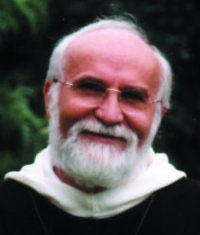
Fr. Jacques Philippe
Tags: Donna Garrett, Interior Freedom, Jacques Philippe, reflections
This entry was posted on Friday, September 13th, 2013 at 9:04 am
You can follow any responses to this entry through the RSS 2.0 feed.
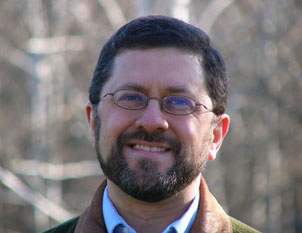 Mike Aquilina shares with Bruce and I the life and teaches of St. John Chrysostom.
Mike Aquilina shares with Bruce and I the life and teaches of St. John Chrysostom.
[powerpress]
John Chrysostom born in 347, his father died soon after his birth, leaving his mother,  Anthusa, a widow at the age of 20.  She never married, sticking with the teachings of St. Paul to stay unmarried; she was a devout Christian and was very committed to her son; they loved and cared for each other very much. She would raise up a son who had a great love for Jesus Christ and who would become of the greatest preachers of all time (imagine him the Billy Graham of his day). He would become the Archbishop of Constantinople, and an important Early Church Father. His denunciation of abuse of authority by both ecclesiastical and political leaders would get him in big trouble, but it didn’t stop him. After his death (or, according to some sources, during his life) he was given the Greek surname chrysostomos, meaning “golden mouthed”, rendered in English as Chrysostom.
Many Christian Churches love and claim St. John Chrysostom. The Orthodox and Eastern Catholic Churches honor him as a saint and count him among the Three Holy Hierarchs, together with Saints Basil the Great and Gregory Nazianzus. He is recognized by the Eastern Orthodox Church and Roman Catholic Church as a saint and Doctor of the Church. Churches of the Western tradition, including the Roman Catholic Church, some Anglican provinces, and parts of the Lutheran Church, commemorate him on 13 September. Some Lutheran and many Anglican provinces commemorate him on the traditional Eastern feast day of 27 January. The Coptic Orthodox Church of Alexandria recognizes John Chrysostom as a saint.
Spiritual Writings:
 - Homilies on the Gospel of St. Matthew
-Â Homilies on Acts
-Â Homilies on Romans
-Â Homilies on First Corinthians
-Â Homilies on Second Corinthians
-Â Homilies on Ephesians
-Â Homilies on Philippians
-Â Homilies on Colossians
-Â Homilies on First Thessalonians
-Â Homilies on Second Thessalonians
-Â Homilies on First Timothy
-Â Homilies on Second Timothy
-Â Homilies on Titus
-Â Homilies on Philemon
-Â Commentary on Galatians
-Â Homilies on the Gospel of John
-Â Homilies on the Epistle to the Hebrews
-Â Homilies on the Statues
-Â No One Can Harm the Man Who Does Not Injure Himself
-Â Two Letters to Theodore After His Fall
-Â Letter to a Young Widow
-Â Homily on St. Ignatius
-Â Homily on St. Babylas
-Â Homily Concerning “Lowliness of Mind”
-Â Instructions to Catechumens
-Â Three Homilies on the Power of Satan
-Â Homily on the Passage “Father, if it be possible . . .”
-Â Homily on the Paralytic Lowered Through the Roof
-Â Homily on the Passage “If your enemy hunger, feed him.”
-Â Homily Against Publishing the Errors of the Brethren
-Â First Homily on Eutropius
-Â Second Homily on Eutropius (After His Captivity)
-Â Four Letters to Olympias
-Â Letter to Some Priests of Antioch
-Â Correspondence with Pope Innocent I
-Â On the Priesthood.
.
Prayer is the light of the soul
A reading from the homilies of St John Chrysostom (Hom 6 on Prayer)
“There is nothing more worthwhile than to pray to God and to converse with him, for prayer unites us with God as his companions. As our bodily eyes are illuminated by seeing the light, so in contemplating God our soul is illuminated by him. Of course the prayer I have in mind is no matter of routine, it is deliberate and earnest. It is not tied down to a fixed timetable; rather it is a state which endures by night and day.
Our soul should be directed in God, not merely when we suddenly think of prayer, but even when we are concerned with something else. If we are looking after the poor, if we are busy in some other way, or if we are doing any type of good work, we should season our actions with the desire and the remembrance of God. Through this salt of the love of God we can all become a sweet dish for the Lord. If we are generous in giving time to prayer, we will experience its benefits throughout our life.
Prayer is the light of the soul, giving us true knowledge of God. It is a link mediating between God and man. By prayer the soul is borne up to heaven and in a marvellous way embraces the Lord. This meeting is like that of an infant crying on its mother, and seeking the best of milk. The soul longs for its own needs and what it receives is better than anything to be seen in the world.
Prayer is a precious way of communicating with God, it gladdens the soul and gives repose to its affections. You should not think of prayer as being a matter of words. It is a desire for God, an indescribable devotion, not of human origin, but the gift of God’s grace. As Saint Paul says: we do not know how to pray as we ought, but the Spirit himself intercedes for us with sighs too deep for words.
Anyone who receives from the Lord the gift of this type of prayer possesses a richness that is not to be taken from him, a heavenly food filling up the soul. Once he has tasted this food, he is set alight by an eternal desire for the Lord, the fiercest of fires lighting up his soul.
To set about this prayer, paint the house of your soul with modesty and lowliness and make it splendid with the light of justice. Adorn it with the beaten gold of good works and, for walls and stones, embellish it assiduously with faith and generosity. Above all, place prayer on top of this house as its roof so that the complete building may be ready for the Lord. Thus he will be received in a splendid royal house and by grace his image will already be settled in your soul.
Â
Tags: doctor of the church, eastern catholic churches, father of the church, fathers mike, heaven, John Chrysostom, mike aquilina, mother, prayer, st john chrysostom
This entry was posted on Friday, September 13th, 2013 at 7:12 am
You can follow any responses to this entry through the RSS 2.0 feed.
Stunning…simply stunning. I love “Mysteries of the Virgin Mary: Living Our Lady’s Graces”! A beautiful and lovingly assembled collection of and meditations on the 13 principal Marian mysteries celebrated by the Church. From the sound theological foundations for our devotion to Our Lady to the reflections and teachings of the saints, Fr. Peter John Cameron, founding editor-in-chief of the monthly worship aid Magnificat, has given us a wonderful resource to deepen our walk with the Blessed Mother of God.
Graces”! A beautiful and lovingly assembled collection of and meditations on the 13 principal Marian mysteries celebrated by the Church. From the sound theological foundations for our devotion to Our Lady to the reflections and teachings of the saints, Fr. Peter John Cameron, founding editor-in-chief of the monthly worship aid Magnificat, has given us a wonderful resource to deepen our walk with the Blessed Mother of God.
[powerpress]
 You kind find this book at www.servantbooks.org
You kind find this book at www.servantbooks.org
Here is the extended web-exclusive edition of our “Inside the Pages” interview with Fr. Cameron[powerpress url=”http://www.old.discerninghearts.com/interviews/Inside_the_Pages-Fr_Peter_John_Cameron_special_extended_edition.mp3″]Download (right click & choose “Save Link As”)
Tags: blessed mother, Church, devotion, graces, marian, meditations, mother of god, mysteries, peter john cameron, reflections, saints, servant books, virgin mary
This entry was posted on Thursday, September 12th, 2013 at 11:13 am
You can follow any responses to this entry through the RSS 2.0 feed.
Of Spiritual Consolation. I call it consolation when some interior movement in the soul is caused, through which the soul comes to be inflamed with love of its Creator and Lord; and when it can in consequence love no created thing on the face of the earth in itself, but in the Creator of them all.
Likewise, when it sheds tears that move to love of its Lord, whether out of sorrow for one’s sins, or for the Passion of Christ our Lord, or because of other things directly connected with His service and praise.
Finally, I call consolation every increase of hope, faith and charity, and all interior joy which calls and attracts to heavenly things and to the salvation of one’s soul, quieting it and giving it peace in its Creator and Lord.
[powerpress]
The Discernment of  Spirits: Setting the Captives Free – Serves as an introduction to the coming series and the Spiritual Exercises of St. Igantius of Loyola
Father Timothy M. Gallagher, O.M.V., was ordained in 1979 as a member of the Oblates of the Virgin Mary, a religious community dedicated to retreats and spiritual formation according to the Spiritual Exercises of St. Ignatius. Â Fr. Gallagher is featured on the EWTN series “Living the Discerning Life: Â The Spiritual Teachings of St. Ignatius of Loyola”.
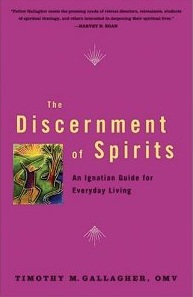 “The Discernment of Spirits: Setting the Captives Free” series is based on Fr. Gallagher’s book “Discern
“The Discernment of Spirits: Setting the Captives Free” series is based on Fr. Gallagher’s book “Discern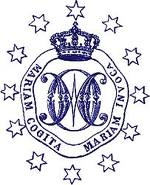 ment of Spirits” published by Crossroads Books.
ment of Spirits” published by Crossroads Books.
.
For more information on the work of Fr. Timothy Gallagher check out his website
.
For the other episodes in this series check out Fr. Timothy Gallagher’s “Discerning Hearts†page
Tags: consolation, ewtn, joy, love
This entry was posted on Thursday, September 12th, 2013 at 11:12 am
You can follow any responses to this entry through the RSS 2.0 feed.

